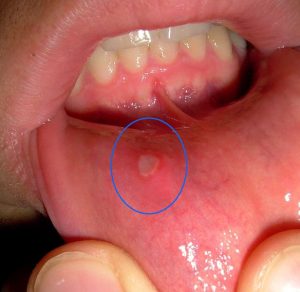Few sensations are as unpleasant as that pain in our mouth that can last for several days, interrupting our meals and even making it difficult to speak in some situations. But how do we heal from the well-known canker sores? Why do they appear, after all? Are there ways to prevent them from showing up? In today’s article, we will address all issues related to this topic so you can clear all your doubts. So if you’re curious to know more, just keep reading!
What Is a Canker Sore
First of all, it is important to understand what a canker sore actually is. By definition, a canker sore is a type of lesion that can be found in various parts of the mouth, such as the inside of the cheeks, the throat, the gums, or even the tongue1. They are characterized by a white and moist covering, which typically causes considerable pain when touched or when the mouth moves in that area. When a sore of this type appears in our mouth, our biggest wish is always for it to go away as quickly as possible. This does happen in most cases, as most canker sores last at most two weeks. However, in some more severe cases, certain types of canker sores can persist in a person’s mouth for even more than a month. It is important to note that canker sores have nothing to do with cold sores caused by the herpes virus, which is a completely different disease with different causes, symptoms, and types of treatment.
Causes of Canker Sores
Discussing the causes of canker sores can be a complicated subject. That’s because the medical community has never reached a definite agreement on what really causes this issue2. Still, it is known that some factors contribute to their easier appearance. Some of these are:
- Trauma to the mouth
- Injuries from brushing or flossing accidents
- Vitamin B12 deficiency
- Low immunity
- Inflammatory diseases of the digestive system
- Emotional instability
How to Treat a Canker Sore?
It’s very common to see people seeking miracle cures for canker sores so they heal quickly. Using salt or baking soda directly on canker sores are just some examples of remedies people tend to try, which, besides having no effect, can end up further irritating the lesions. Moreover, this drive for a quick cure can lead to greater interference with the wounds, which might actually make them take longer to heal. It is important to know that canker sores tend to heal on their own in about two weeks, on average. However, some measures can be taken3 to alleviate the pain they cause, such as rinsing with propolis, for example. If your pain is intense and you see a doctor, he may prescribe medication to help relieve the symptoms and help your canker sores heal faster. However, as we have said, the most common and recommended approach is not to interfere with the lesions and let them heal on their own.
Risk Factors
As previously mentioned, there is no specific cause for the appearance of canker sores, but there are some factors that contribute to their development. In addition, there are other factors to consider that can serve as alerts so that a person can take precautions against canker sores. Some of the main risk factors are:
- Drinking too many soft drinks
- Excessive intake of acidic foods
- Genetic predisposition
- Lack of vitamin B12
- Immunological disorders
- Psychological conditions such as depression or anxiety
- Poor oral hygiene
- Excessive stress
- Gastrointestinal diseases
How to Prevent Canker Sores?
Because there is no specific cause, preventing canker sores is also somewhat hard to specify. Still, we can point out some steps you can take to avoid this type of problem, especially if you are in a risk group. Adopting a diet richer in vitamin B12 and one that helps prevent weakening of the immune system, for example, can be a great way to prevent them. Additionally, managing any gastric issues you may have is also very helpful. Other actions you can take involve being careful not to cause injuries inside the mouth, especially when it comes to brushing. Of course, these actions do not guarantee that you won’t get canker sores, but they will certainly make their appearance less likely. Even though canker sores are not among the most serious health problems, nobody enjoys having one. That’s why it’s important to understand what they are, how to treat them properly, and, most importantly, how to prevent them. Remember that this kind of problem could also be a sign of more serious conditions you might not be aware of yet, especially those related to the digestive system. So, if you get canker sores very frequently, it’s important to see a doctor to get all necessary tests done and to be sure your health is really up to date. Remember: nothing is too minor when it comes to your health.












